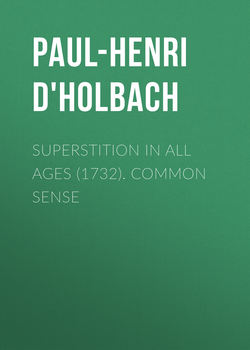Читать книгу Superstition In All Ages (1732). Common Sense - Paul-Henri d'Holbach - Страница 44
COMMON SENSE
XLI. – OTHER PROOFS THAT MOTION IS IN THE ESSENCE OF MATTER, AND THAT IT IS NOT NECESSARY TO SUPPOSE A SPIRITUAL MOTOR
ОглавлениеIt is but by the diversity of impressions or of effects which substances or bodies make upon us, that we feel them, that we have perceptions and ideas of them, that we distinguish them one from another, that we assign to them peculiarities. Moreover, in order to perceive or to feel an object, this object must act upon our organs; this object can not act upon us without exciting some motion in us; it can not produce any motion in us if it is not itself in motion. As soon as I see an object, my eyes must be struck by it; I can not conceive of light and of vision without a motion in the luminous, extended, and colored body which communicates itself to my eye, or which acts upon my retina. As soon as I smell a body, my olfactory nerve must be irritated or put into motion by the parts exhaled from an odorous body. As soon as I hear a sound, the tympanum of my ear must be struck by the air put in motion by a sonorous body, which could not act if it was not moved of itself. From which it follows, evidently, that without motion I can neither feel, see, distinguish, compare, nor judge the body, nor even occupy my thought with any matter whatever. It is said in the schools, that the essence of a being is that from which flow all the properties of that being. Now then, it is evident that all the properties of bodies or of substances of which we have ideas, are due to the motion which alone informs us of their existence, and gives us the first conceptions of it. I can not be informed or assured of my own existence but by the motions which I experience within myself. I am compelled to conclude that motion is as essential to matter as its extension, and that it can not be conceived of without it. If one persists in caviling about the evidences which prove to us that motion is an essential property of matter, he must at least acknowledge that substances which seemed dead or deprived of all energy, take motion of themselves as soon as they are brought within the proper distance to act upon each other. Pyrophorus, when enclosed in a bottle or deprived of contact with the air, can not take fire by itself, but it burns as soon as exposed to the air. Flour and water cause fermentation as soon as they are mixed. Thus dead substances engender motion of themselves. Matter has then the power to move itself, and nature, in order to act, does not need a motor whose essence would hinder its activity.
